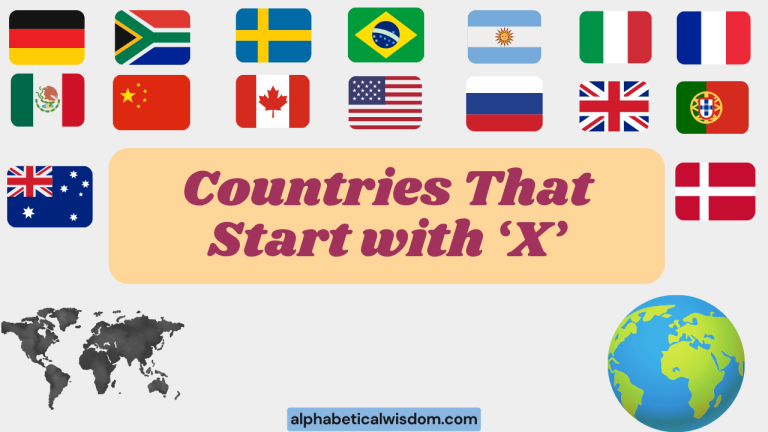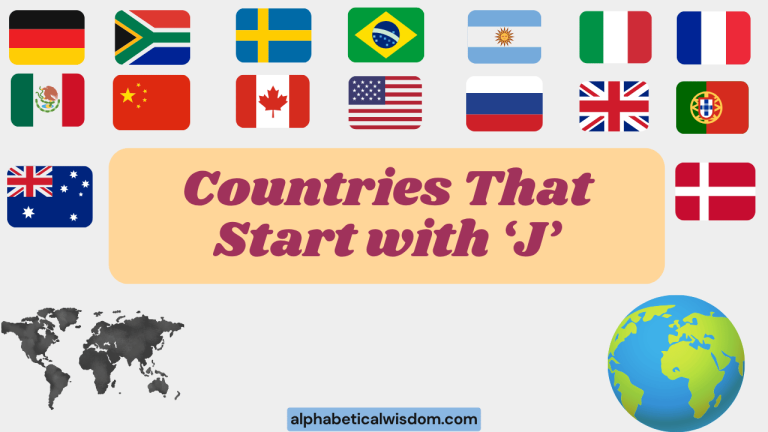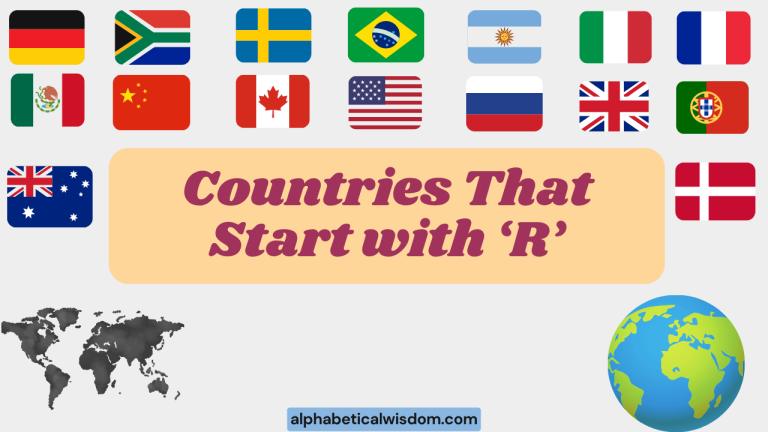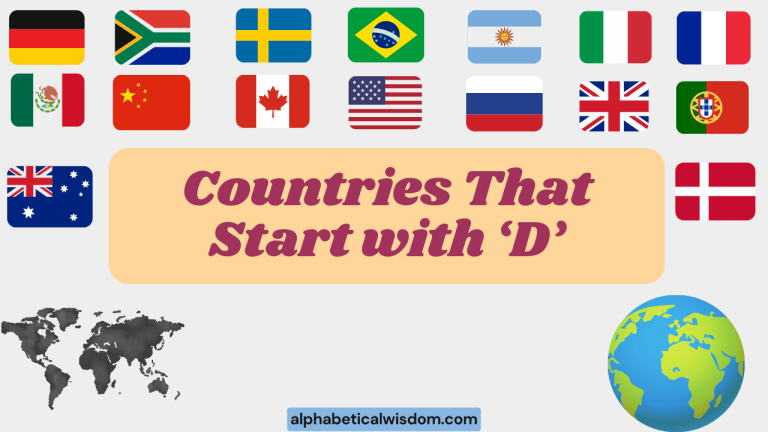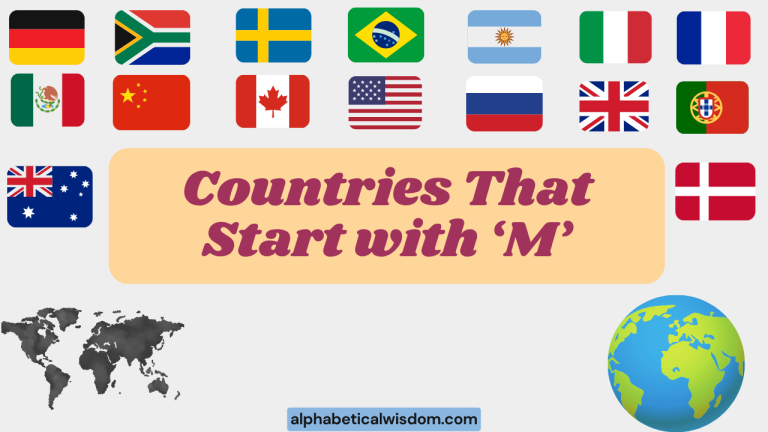Countries Starting With A: Grammar & Usage Guide
Understanding how to correctly use country names, especially those starting with the letter ‘A,’ is crucial for clear and accurate communication in English. This article provides a comprehensive guide to the grammar rules and usage conventions associated with these countries.
From proper capitalization to the use of articles and adjectives, this guide covers everything you need to know. This article will benefit English language learners, writers, students, and anyone who wants to improve their understanding of English grammar and geography.
Table of Contents
- Introduction
- Definition: Countries Starting with ‘A’
- Structural Breakdown
- Types and Categories
- Examples of Countries Starting with ‘A’
- Usage Rules
- Common Mistakes
- Practice Exercises
- Advanced Topics
- FAQ
- Conclusion
Definition: Countries Starting with ‘A’
Countries starting with the letter ‘A’ refer to sovereign states and territories whose official English name begins with the letter ‘A.’ These names are proper nouns, requiring specific grammatical treatment. The correct usage of these names involves understanding capitalization rules, the potential use of articles (like “the”), and the formation of adjectives and nouns denoting nationality.
Proper usage is essential for clear communication and demonstrates respect for different cultures and nations.
The classification of these entities includes independent countries recognized by the international community, dependent territories or regions with varying degrees of autonomy, and historical entities that no longer exist as sovereign nations but are relevant in historical or cultural contexts. Understanding the function of these names within sentences involves recognizing them as subjects, objects, or modifiers, depending on the sentence structure and intended meaning.
The context in which these names are used can range from casual conversation to formal writing, academic research, and international diplomacy, each requiring a different level of precision and formality.
Structural Breakdown
The structural breakdown of country names starting with ‘A’ involves several key elements. These elements include capitalization, article usage (if any), the base name of the country, and any additional descriptors.
For example, in “Argentina,” the entire word is capitalized, and there is no preceding article. In contrast, for “the Bahamas,” “the” is a definite article that is part of the official name.
Understanding these structural elements is crucial for using country names correctly in various grammatical contexts.
The patterns observed include single-word names (e.g., Albania), multi-word names (e.g., Antigua and Barbuda), and names that require the definite article “the” (e.g., the United Arab Emirates). The rules governing these structures are based on the conventions established by international organizations and the common usage in English.
Exceptions exist, particularly with historical names or informal references. For instance, one might informally say “I’m going to America,” even though the full name is “the United States of America.”
Types and Categories
Independent Countries
Independent countries are sovereign states recognized by the international community. These countries have their own governments, laws, and territories.
Examples include Afghanistan, Albania, Algeria, Andorra, Angola, Antigua and Barbuda, Argentina, Armenia, Australia, Austria, Azerbaijan.
Dependent Territories and Regions
Dependent territories are regions that are not fully sovereign and are under the jurisdiction of another country. These territories may have varying degrees of autonomy.
Examples include American Samoa (under the jurisdiction of the United States) and Aruba (a constituent country of the Kingdom of the Netherlands).
Historical Entities
Historical entities are countries or regions that existed in the past but no longer exist as independent states. These entities are often referred to in historical or cultural contexts.
An example is Austria-Hungary, a former empire that existed from 1867 to 1918.
Examples of Countries Starting with ‘A’
Independent Countries
Here are examples of independent countries that start with the letter “A”. The table includes the country name, its capital city, and its continent.
| Country | Capital City | Continent |
|---|---|---|
| Afghanistan | Kabul | Asia |
| Albania | Tirana | Europe |
| Algeria | Algiers | Africa |
| Andorra | Andorra la Vella | Europe |
| Angola | Luanda | Africa |
| Antigua and Barbuda | St. John’s | North America |
| Argentina | Buenos Aires | South America |
| Armenia | Yerevan | Asia/Europe |
| Australia | Canberra | Oceania |
| Austria | Vienna | Europe |
| Azerbaijan | Baku | Asia/Europe |
| Austria | Vienna | Europe |
| Azerbaijan | Baku | Asia/Europe |
| Australia | Canberra | Oceania |
| Austria | Vienna | Europe |
| Azerbaijan | Baku | Asia/Europe |
| Australia | Canberra | Oceania |
| Austria | Vienna | Europe |
| Azerbaijan | Baku | Asia/Europe |
| Australia | Canberra | Oceania |
| Austria | Vienna | Europe |
Adjectives and Nationalities
This table provides examples of adjectives and nationalities derived from country names starting with “A.” The correct formation of these adjectives and nouns is important for accurate communication.
| Country | Adjective | Nationality |
|---|---|---|
| Afghanistan | Afghan | Afghan |
| Albania | Albanian | Albanian |
| Algeria | Algerian | Algerian |
| Andorra | Andorran | Andorran |
| Angola | Angolan | Angolan |
| Antigua and Barbuda | Antiguan and Barbudan | Antiguan and Barbudan |
| Argentina | Argentine | Argentine |
| Armenia | Armenian | Armenian |
| Australia | Australian | Australian |
| Austria | Austrian | Austrian |
| Azerbaijan | Azerbaijani | Azerbaijani |
| Afghanistan | Afghan | Afghan |
| Albania | Albanian | Albanian |
| Algeria | Algerian | Algerian |
| Andorra | Andorran | Andorran |
| Angola | Angolan | Angolan |
| Antigua and Barbuda | Antiguan and Barbudan | Antiguan and Barbudan |
| Argentina | Argentine | Argentine |
| Armenia | Armenian | Armenian |
| Australia | Australian | Australian |
Common Phrases
This table provides examples of common phrases using country names that start with “A”. The phrases illustrate how these names are used in context.
| Phrase | Context |
|---|---|
| From Afghanistan to the world | A phrase emphasizing global reach |
| Albania’s beautiful coastline | Describing a geographical feature |
| The Algerian desert | Referring to a specific region |
| Andorra’s tax haven status | Discussing economic characteristics |
| Angola’s oil reserves | Referring to natural resources |
| Antigua and Barbuda’s tourism industry | Discussing economic activities |
| Argentine tango | Referring to a cultural element |
| Armenia’s ancient history | Discussing historical significance |
| Australian wildlife | Referring to native fauna |
| Austrian architecture | Describing architectural style |
| Azerbaijan’s rich culture | Discussing cultural aspects |
| Traveling through Afghanistan | Describing a journey |
| Visiting Albania’s historical sites | Referring to tourist attractions |
| Exploring the Algerian Sahara | Describing geographical exploration |
| Hiking in Andorra’s mountains | Referring to outdoor activities |
| Investing in Angola’s economy | Discussing economic opportunities |
| Relaxing on Antigua and Barbuda’s beaches | Referring to leisure activities |
| Learning about Argentine history | Discussing historical education |
| Studying Armenian language and culture | Referring to academic studies |
| Enjoying Australian coffee | Referring to a popular beverage |
Usage Rules
Capitalization
Country names are proper nouns and must always be capitalized. This rule applies to all parts of the name, including articles and conjunctions if they are part of the official name.
For example, “Antigua and Barbuda” and “the Bahamas” are both fully capitalized.
Incorrect capitalization can lead to confusion and misinterpretation. Always double-check the correct capitalization of country names in formal writing and official documents.
Consistent and accurate capitalization demonstrates attention to detail and respect for the countries being referenced.
Use of Articles: “The”
Some country names require the definite article “the” as part of their official name. Examples include “the Bahamas,” “the Gambia,” and “the United Arab Emirates.” The use of “the” is determined by the historical and political context of the country’s naming convention.
Using or omitting “the” incorrectly can change the meaning or sound unnatural.
To determine whether a country name requires “the,” consult official sources such as government websites, international organizations, or reputable geographical references. Pay attention to the specific context in which the name is used, as some informal references may omit “the” even when it is part of the official name.
Always strive for accuracy in formal writing.
Adjectives and Nationalities
Adjectives and nouns denoting nationality are derived from country names and are used to describe people, things, or concepts associated with that country. For example, the adjective for “Argentina” is “Argentine,” and the noun for nationality is also “Argentine.” These adjectives and nouns are generally capitalized.
Some adjectives and nationality nouns have irregular forms. For example, the adjective for “Albania” is “Albanian,” and the noun for nationality is also “Albanian.” Ensure you use the correct form by consulting a dictionary or grammar guide.
Correct usage of these forms is essential for clear and accurate communication about different cultures and nationalities.
Plurals
Most country names are singular and do not have a plural form. However, some names refer to a group of islands or territories and may be treated as plural.
For example, “the Bahamas” is treated as plural in some contexts, such as “the Bahamas are known for their beautiful beaches.”
When using a country name that may be treated as plural, pay attention to the agreement between the subject and verb. If the name is treated as plural, use a plural verb form.
Consistent and accurate usage of plurals demonstrates a strong command of English grammar.
Possessives
To form the possessive of a country name, add an apostrophe and “s” (‘s) to the end of the name. For example, “Afghanistan’s economy” refers to the economy of Afghanistan.
If the country name ends in “s,” you can either add an apostrophe and “s” (‘s) or just an apostrophe (‘). Both forms are acceptable, but consistency is important.
For example, “the Bahamas’ beaches” or “the Bahamas’s beaches” are both acceptable ways to refer to the beaches of the Bahamas. Choose one form and use it consistently throughout your writing.
Correct usage of possessives is essential for clear and concise communication.
Common Mistakes
One common mistake is the incorrect capitalization of country names. Incorrect: “albania is a beautiful country.” Correct: “Albania is a beautiful country.”
Another common mistake is the misuse of the definite article “the.” Incorrect: “I visited Bahamas last year.” Correct: “I visited the Bahamas last year.”
Incorrect adjective or nationality forms are also frequent. Incorrect: “She is from Afghan.” Correct: “She is Afghan.” Or “She is from Afghanistan.”
Misuse of possessives can also occur. Incorrect: “Afghanistan economy is struggling.” Correct: “Afghanistan’s economy is struggling.”
Finally, using the wrong plural form can cause confusion. Incorrect: “The Bahamas is a beautiful country.” Correct: “The Bahamas are a beautiful country.” (when referring to the islands collectively)
| Incorrect | Correct |
|---|---|
| algeria is in africa. | Algeria is in Africa. |
| I want to visit andorra. | I want to visit Andorra. |
| She is a austrian citizen. | She is an Austrian citizen. |
| He traveled to bahamas. | He traveled to the Bahamas. |
| The armenia culture is rich. | Armenia’s culture is rich. |
| algeria is in africa. | Algeria is in Africa. |
| I want to visit andorra. | I want to visit Andorra. |
| She is a austrian citizen. | She is an Austrian citizen. |
| He traveled to bahamas. | He traveled to the Bahamas. |
| The armenia culture is rich. | Armenia’s culture is rich. |
Practice Exercises
Exercise 1: Capitalization
Correct the capitalization in the following sentences.
| Question | Answer |
|---|---|
| 1. albania is a country in europe. | 1. Albania is a country in Europe. |
| 2. i want to visit australia someday. | 2. I want to visit Australia someday. |
| 3. she is from antigua and barbuda. | 3. She is from Antigua and Barbuda. |
| 4. argentina is famous for its tango. | 4. Argentina is famous for its tango. |
| 5. austria is known for its music. | 5. Austria is known for its music. |
| 6. he lives in andorra la vella. | 6. He lives in Andorra la Vella. |
| 7. the capital of algeria is algiers. | 7. The capital of Algeria is Algiers. |
| 8. albania is a country in europe. | 8. Albania is a country in Europe. |
| 9. i want to visit australia someday. | 9. I want to visit Australia someday. |
| 10. she is from antigua and barbuda. | 10. She is from Antigua and Barbuda. |
Exercise 2: Articles
Fill in the blanks with “the” if necessary.
| Question | Answer |
|---|---|
| 1. I traveled to ___ Bahamas last year. | 1. I traveled to the Bahamas last year. |
| 2. ___ Argentina is a beautiful country. | 2. Argentina is a beautiful country. |
| 3. She is from ___ United Arab Emirates. | 3. She is from the United Arab Emirates. |
| 4. ___ Albania has a rich history. | 4. Albania has a rich history. |
| 5. He visited ___ Austria last summer. | 5. He visited Austria last summer. |
| 6. I traveled to ___ Bahamas last year. | 6. I traveled to the Bahamas last year. |
| 7. ___ Argentina is a beautiful country. | 7. Argentina is a beautiful country. |
| 8. She is from ___ United Arab Emirates. | 8. She is from the United Arab Emirates. |
| 9. ___ Albania has a rich history. | 9. Albania has a rich history. |
| 10. He visited ___ Austria last summer. | 10. He visited Austria last summer. |
Exercise 3: Adjectives and Nationalities
Use the correct adjective or nationality in the following sentences.
| Question | Answer |
|---|---|
| 1. She is an ___ citizen. (Albania) | 1. She is an Albanian citizen. |
| 2. He enjoys ___ music. (Argentina) | 2. He enjoys Argentine music. |
| 3. They are ___ dancers. (Australia) | 3. They are Australian dancers. |
| 4. This is an ___ dish. (Austria) | 4. This is an Austrian dish. |
| 5. The ___ culture is fascinating. (Azerbaijan) | 5. The Azerbaijani culture is fascinating. |
| 6. She is an ___ citizen. (Albania) | 6. She is an Albanian citizen. |
| 7. He enjoys ___ music. (Argentina) | 7. He enjoys Argentine music. |
| 8. They are ___ dancers. (Australia) | 8. They are Australian dancers. |
| 9. This is an ___ dish. (Austria) | 9. This is an Austrian dish. |
| 10. The ___ culture is fascinating. (Azerbaijan) | 10. The Azerbaijani culture is fascinating. |
Advanced Topics
Idiomatic Expressions
Some country names appear in idiomatic expressions, which are phrases whose meaning cannot be understood from the literal meanings of the individual words. For example, while less common with countries starting with ‘A’ compared to some others, it’s important to be aware of such expressions.
Understanding these idioms requires familiarity with cultural and historical contexts.
For instance, knowing that certain adjectives derived from country names have specific connotations in certain contexts is crucial. These connotations may be positive, negative, or neutral, depending on the historical relationship between the countries and the cultural perceptions associated with them.
A deep understanding of these nuances can enhance your communication skills and avoid potential misunderstandings.
Historical and Cultural Context
The names of countries often have rich historical and cultural origins. Understanding the etymology and historical context of these names can provide valuable insights into the country’s identity and culture.
For example, the name “Afghanistan” has roots in ancient Persian and Sanskrit words, reflecting the country’s historical significance as a crossroads of civilizations. Similarly, “Australia” derives from the Latin “Terra Australis Incognita,” meaning “unknown southern land,” reflecting European exploration and discovery.
Learning about the historical and cultural context of country names can deepen your appreciation for different cultures and improve your understanding of international relations. This knowledge can also enhance your ability to communicate effectively and respectfully in diverse settings.
Consider researching the origins and evolution of country names as a way to expand your knowledge and cultural awareness.
FAQ
Q1: Why is it important to capitalize country names?
A1: Capitalizing country names is essential because they are proper nouns. Proper nouns refer to specific people, places, or things, and capitalization distinguishes them from common nouns.
Correct capitalization demonstrates attention to detail and respect for the countries being referenced.
Q2: When should I use “the” before a country name?
A2: Use “the” before a country name when it is part of the official name, such as “the Bahamas” or “the United Arab Emirates.” Consult official sources to confirm whether “the” is required. Omitting or adding “the” incorrectly can change the meaning or sound unnatural.
Q3: How do I form the adjective and nationality for a country?
A3: Adjectives and nouns denoting nationality are derived from country names. For example, the adjective for “Argentina” is “Argentine,” and the noun for nationality is also “Argentine.” Some forms are irregular, so consult a dictionary or grammar guide for the correct usage.
Q4: What are some common mistakes to avoid when using country names?
A4: Common mistakes include incorrect capitalization, misuse of “the,” incorrect adjective or nationality forms, misuse of possessives, and using the wrong plural form. Double-check your writing and consult reliable sources to avoid these errors.
Q5: Are there any exceptions to the rules for using country names?
A5: Yes, there are exceptions, particularly with historical names or informal references. For instance, one might informally say “I’m going to America,” even though the full name is “the United States of America.” However, in formal writing, it’s best to adhere to the official names and grammatical rules.
Q6: How can I improve my knowledge of country names and their correct usage?
A6: You can improve your knowledge by reading widely, consulting dictionaries and grammar guides, practicing writing, and paying attention to how country names are used in reputable sources. Additionally, learning about the historical and cultural context of country names can deepen your understanding.
Q7: Why do some country names have plural forms?
A7: Some country names have plural forms because they refer to a group of islands or territories, such as “the Bahamas.” In these cases, the name may be treated as plural in some contexts, requiring a plural verb form. Pay attention to subject-verb agreement when using these names.
Q8: How do I form the possessive of a country name?
A8: To form the possessive of a country name, add an apostrophe and “s” (‘s) to the end of the name. For example, “Afghanistan’s economy” refers to the economy of Afghanistan.
If the country name ends in “s,” you can either add an apostrophe and “s” (‘s) or just an apostrophe (‘). Both forms are acceptable, but consistency is important.
Q9: Are there any style guides that provide specific guidance on using country names?
A9: Yes, style guides such as the AP Stylebook and the Chicago Manual of Style provide guidance on using country names, including capitalization, article usage, and adjective/nationality forms. Consult these style guides for authoritative advice on grammar and usage.
Q10: Where can I find a comprehensive list of countries and their official names?
A10: You can find a comprehensive list of countries and their official names on the websites of international organizations such as the United Nations, the World Bank, and the International Monetary Fund. These organizations maintain up-to-date lists of member states and their official names.
Conclusion
Mastering the grammar and usage of country names, especially those starting with the letter ‘A,’ is essential for clear and accurate communication. This guide has covered key aspects, including capitalization, article usage, adjective formation, and common mistakes.
By understanding these rules and practicing consistently, you can improve your English language skills and communicate effectively in diverse contexts.
Remember to consult reliable sources, such as dictionaries, grammar guides, and style manuals, for accurate information. Pay attention to the specific context in which country names are used, and strive for consistency in your writing.
With practice and attention to detail, you can confidently and accurately use country names in your communication.

